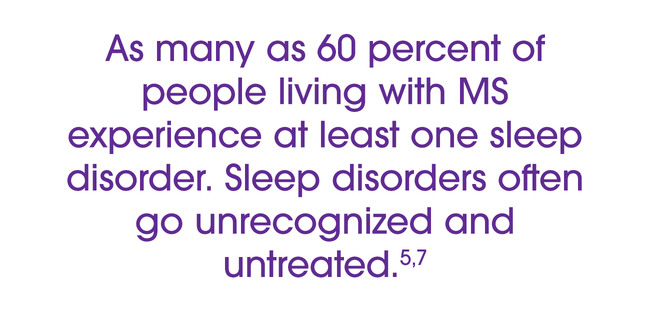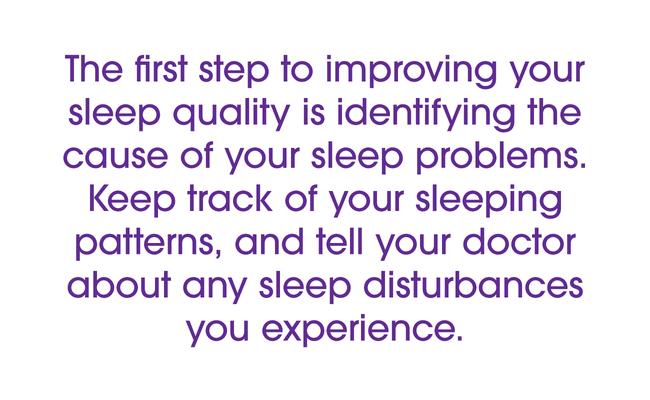
Powered By





 Continue with Facebook
Continue with your email
Continue with Facebook
Continue with your email
One of the most common symptoms of multiple sclerosis is fatigue. Fatigue in MS can present as general exhaustion or muscular fatigue.
For some people with MS, fatigue is linked to sleep problems and sleep disorders, such as insomnia, obstructive sleep apnea (OSA), or restless legs syndrome (RLS). These disorders often go undiagnosed and untreated.
If you think you have a sleep disorder, it’s important to receive the right diagnosis and treatment to manage fatigue and its effects on your daily life.
Fatigue is very common in people with MS. Studies show that 75 percent to 95 percent of people living with MS experience fatigue.
As disabling as fatigue can be, no clear cause for it has been established in people with MS. Some researchers have associated fatigue with the progression of MS. However, studies also show that fatigue occurs at all stages of MS and isn’t necessarily related to the duration of the disease.
According to a study by Pennsylvania State University, depression and sleep disturbances are more closely linked to MS-related fatigue than disease progression. Of these three contributing factors, sleep disturbance was identified as the biggest risk factor for MS fatigue. This is in line with other studies, which estimate the prevalence of sleep problems to be 25 percent to 54 percent higher in people living with MS than in the general population.
As many as 60 percent of people living with MS experience at least one sleep disorder. However, these disorders are often unrecognized and untreated.

Insomnia is one of several sleep disorders associated with MS. More than 13,000 members of MyMSTeam report that they experience insomnia. As one member wrote, “Insomnia is a cruel symptom. None of them are fun, but at least sleep offers some solace.”
Other sleep disorders associated with MS include restless legs syndrome, narcolepsy, obstructive sleep apnea, rapid eye movement (REM) sleep behavior disorder, and nocturnal movement disorders — all of which can contribute to sleep disturbance.
In a study published in the Journal of Clinical Sleep Medicine (JCSM) on 50 individuals with MS, poor sleep was reported by 38 percent of participants — as was fatigue. The report did not specify whether the same people experienced both conditions, but the high prevalence of both is telling.
Sleep disturbance problems are some of the most commonly discussed subjects on MyMSTeam. One member shared their difficulties: “I haven’t slept in two days. I’m exhausted.”
Another member shared how symptoms of MS impacted their ability to get a good night’s sleep. “I usually wake up in the middle of the night in pain,” they wrote. “During the day, I can distract myself. It’s at night when I’m lying down that I really feel it, and it interferes with my comfort.”
Several types of sleep disorders have been associated with MS-related fatigue, including insomnia, restless legs syndrome, narcolepsy, obstructive sleep apnea, and central sleep apnea.
Insomnia, the inability to fall or stay asleep, is one of the most common sleep disorders in people with MS. Insomnia can lead to daytime sleepiness, irritability, depression, and anxiety, all of which could contribute to fatigue.

Restless legs syndrome is characterized by an uncomfortable sensation that causes an uncontrollable urge to move the legs. It is often triggered by inactivity, and usually eases when moving. As a result, RLS is worse during periods of inactivity such as when sitting and lying down or at night when going to sleep.
People with RLS experience nighttime leg twitching, which can disrupt their sleep. According to the JCSM study, RLS was associated with both poor sleep and fatigue, with 28 percent of participants with MS exhibiting signs of the condition.
The main signs of narcolepsy are excessive daytime sleepiness (EDS), cataplexy, and abnormalities during the rapid eye movement phase of sleep. EDS causes individuals with narcolepsy to find it hard to stay awake throughout the day. This leads to characteristic drowsiness and sudden urges to sleep. As a result, people with narcolepsy often take daytime naps, which can result in nighttime sleep disruption. Thus, narcolepsy can also cause insomnia.
In a meta-analysis of 116 individuals with narcolepsy symptoms, 10 of the participants also had MS.
Obstructive sleep apnea causes the upper airway to partially or totally collapse during sleep, reducing or completely blocking airflow. This disrupted airflow causes a person to awaken multiple times during the night.
Another form of sleep apnea that can cause disordered breathing is central sleep apnea. While obstructive sleep apnea is characterized by insufficient airflow to the lungs due to physical blockage, central sleep apnea is caused by a lack of effort to breathe during sleep.
People with MS are at a higher risk of developing sleep apneas than the general population. Some researchers suggest the connection is due to changes in the functioning of the brain stem caused by MS or lesions affecting the brain stem. The brain stem is responsible for a range of bodily processes, including keeping the airway open and maintaining the effort to breathe during sleep.
Apart from insomnia, RLS, narcolepsy, and sleep apnea, there are many other possible causes or contributors to sleep disturbance in people with MS. These include:
Getting enough sleep at night may improve your fatigue during the day and your overall well-being. Fortunately, you don’t have to accept sleep disruptions as part of your normal life.
The first step to improving your sleep quality is identifying the cause of your sleep problems. Keep track of your sleeping patterns, and tell your doctor about any sleep disturbances you experience. You can use a sleep journal to help you track your sleep patterns. If you are diagnosed with a sleep disorder, it may be effectively managed with medications or other approved treatment options.

In addition, sleep hygiene, psychotherapy, and physical therapy can all be effective in helping manage sleep issues for people with MS.
According to the National Sleep Foundation, “Strong sleep hygiene means having both a bedroom environment and daily routines that promote consistent, uninterrupted sleep.” Here are some things you can do to improve your sleep hygiene.
Setting and sticking to a regular bedtime routine and sleeping schedule can accustom your body to sufficient sleep. Take care to go to bed at the same time every day, even on weekends.
One MyMSTeam member suggested practicing meditation and breathing exercises to relax before bed: “With each deep breath you take, imagine sending that breath to different parts of your body. By the time I go from my toes to the top of my head, I am sleepy.”
Create a sleep-inducing environment. As one MyMSTeam member suggested, “Turn off the screens. No TV, computer, or phone. [Play] soft, quiet music, and put pajamas on in a dark room.”
Recently, cognitive behavioral therapy has been found to be more successful than sleeping medication for improving some types of sleep disturbances. This therapy works by identifying and modifying the thought patterns and behaviors that contribute to sleep disturbance. Cognitive behavioral therapy can also help treat the underlying mental health problems contributing to sleep difficulties, such as stress, anxiety, and depression.
Regular physical activity and guided physical therapy, used to improve strength and flexibility in people living with MS, can also be effective for reducing sleep disruption caused by pain or bodily discomfort.
More than 164,000 members strong, MyMSTeam is a social network for people living with MS and their loved ones. Members often share their experiences with fatigue and sleep problems.
Are you living with fatigue, sleep problems, and MS? Have you found any ways to improve your sleep? Share in the comments below or post on MyMSTeam.
Get updates directly to your inbox.



I Suffer Badly From Insomnia … Can Anyone Suggest A Medication To Help This … I Have Tried Everything … And Am Desperate … Il
 Continue with Facebook
Continue with your email
Continue with Facebook
Continue with your email
Become a member to get even more




This is a member-feature!
Sign up for free to view article comments.
A MyMSTeam Member
Sleep apnea can be seen in multiple sclerosis and concept your energy. I have sleep apnea both obstructive and Central apnea where the brain doesn't tell you to breathe. I have to see a sub specialist… read more
We'd love to hear from you! Please share your name and email to post and read comments.
You'll also get the latest articles directly to your inbox.